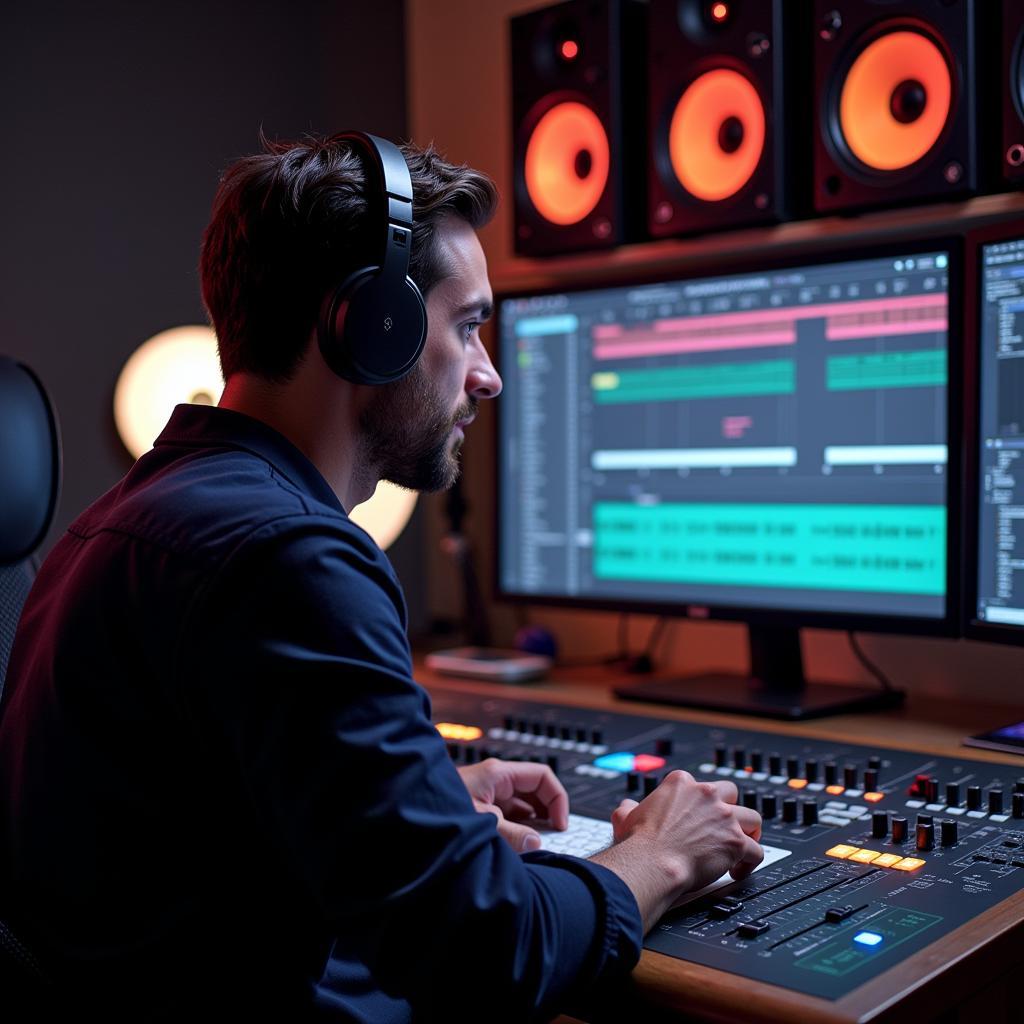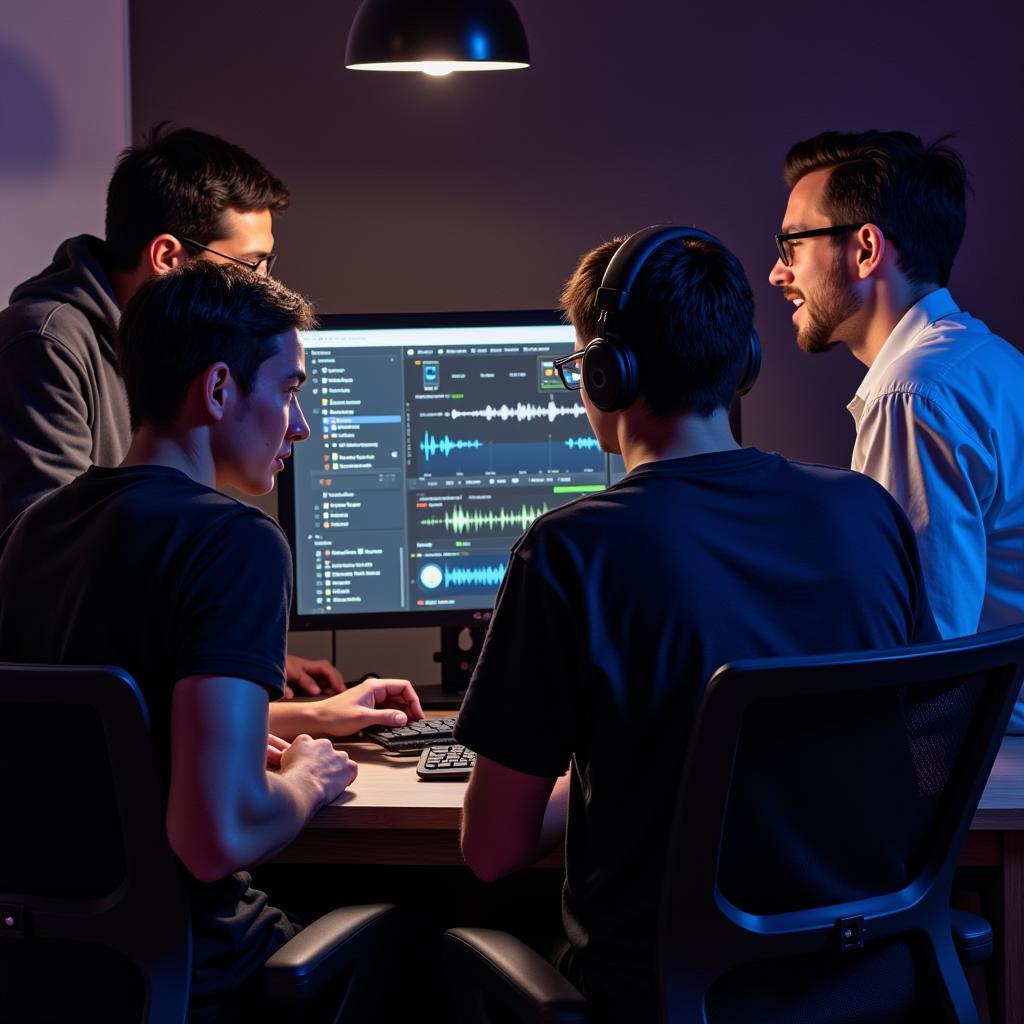The video game industry is booming, and with it comes a growing demand for skilled professionals in various fields. Among these sought-after roles are Game Audio Jobs, which encompass a diverse range of specializations that breathe life and immersion into the gaming experience. If you’re passionate about both video games and sound, a career in game audio might just be your calling.
Exploring the Sonic Landscape: What are Game Audio Jobs?
Game audio jobs involve creating and implementing all the sounds you hear in video games. From the epic soundtrack that sets the mood to the realistic footsteps that ground you in the environment, every sonic element contributes to the overall player experience.
These jobs require a unique blend of technical skills, artistic talent, and a deep understanding of game design principles. It’s about more than just making noise; it’s about crafting an immersive soundscape that enhances gameplay and evokes emotion.
Delving into the Different Types of Game Audio Jobs
The field of game audio is surprisingly diverse. Here are some of the most common roles you might encounter:
- Sound Designer: The maestro of the game’s sonic landscape, responsible for creating and implementing all sound effects, from weapon fire and explosions to ambient noises and UI sounds.
- Composer: The musical storyteller, composing original music that sets the tone, enhances the narrative, and creates an emotional connection with the player.
- Dialogue Editor: The voice whisperer, responsible for recording, editing, and integrating voice-over performances into the game.
- Audio Programmer: The technical wizard, bridging the gap between sound design and game development by implementing audio systems and tools.
- Audio Director: The conductor of the audio team, overseeing all aspects of game audio production and ensuring a cohesive sonic experience.
 Audio Engineer Mixing Game Soundtrack
Audio Engineer Mixing Game Soundtrack
What Skills Do You Need to Land Game Audio Jobs?
While each role has its specific requirements, certain core skills are essential for success in game audio:
- Strong Audio Fundamentals: A solid understanding of audio engineering principles, including recording, editing, mixing, and mastering.
- Proficiency in Audio Software: Mastery of industry-standard software like Pro Tools, Wwise, or Reaper is crucial for sound design, composition, and implementation.
- Creative Flair and Musicality: A good ear for sound and a knack for creating immersive soundscapes are essential for sound designers and composers.
- Collaboration and Communication: Game audio is a team effort, so being able to work effectively with designers, programmers, and other team members is vital.
- Passion for Games: A genuine love for video games and an understanding of different genres and gameplay mechanics is a must.
Breaking into the Industry: Tips for Aspiring Game Audio Professionals
Landing your dream job in game audio takes dedication and a strategic approach:
- Hone Your Craft: Practice, experiment, and build a strong portfolio showcasing your best work.
- Network and Connect: Attend industry events, join online communities, and reach out to professionals in the field.
- Gain Experience: Seek internships, freelance opportunities, or even contribute to indie game projects to gain valuable experience.
- Stay Updated: Keep abreast of the latest trends in game audio technology, software, and design principles.
 Game Developers Collaborating on Audio Design
Game Developers Collaborating on Audio Design
Conclusion: A Sound Career Choice
Game audio jobs offer a unique and rewarding path for those passionate about sound and video games. With dedication, hard work, and a love for the craft, you can create immersive and unforgettable gaming experiences that resonate with players worldwide.
Ready to embark on your game audio journey?
FAQs:
1. What is the average salary for game audio jobs?
Salaries can vary greatly depending on experience, location, and the size of the studio. However, the average salary for a game audio professional in the US is around $60,000 per year.
2. Do I need a degree to work in game audio?
While a degree in audio engineering or music technology can be beneficial, it’s not always mandatory. A strong portfolio and relevant experience can be equally valuable.
3. What are some resources for learning more about game audio?
Websites like Game Audio Network Guild (GANG) and online courses from platforms like Udemy and Coursera offer valuable insights and training.
4. How can I find game audio jobs?
Job boards like Indeed, LinkedIn, and Gamasutra regularly post game audio positions. Networking with industry professionals is also a great way to discover opportunities.
5. What are some tips for creating a compelling game audio portfolio?
Focus on showcasing your best work, highlighting different skills and styles. Include a variety of projects, from short sound design demos to full game soundtracks.
Need further assistance in navigating the world of game audio jobs? Contact us at Phone Number: 0902476650, Email: [email protected]. Or visit us at 139 Đ. Võ Văn Kiệt, Hoà Long, Bà Rịa, Bà Rịa – Vũng Tàu, Vietnam. Our dedicated customer support team is available 24/7 to answer your questions and guide you on your path to a rewarding career in game audio.





